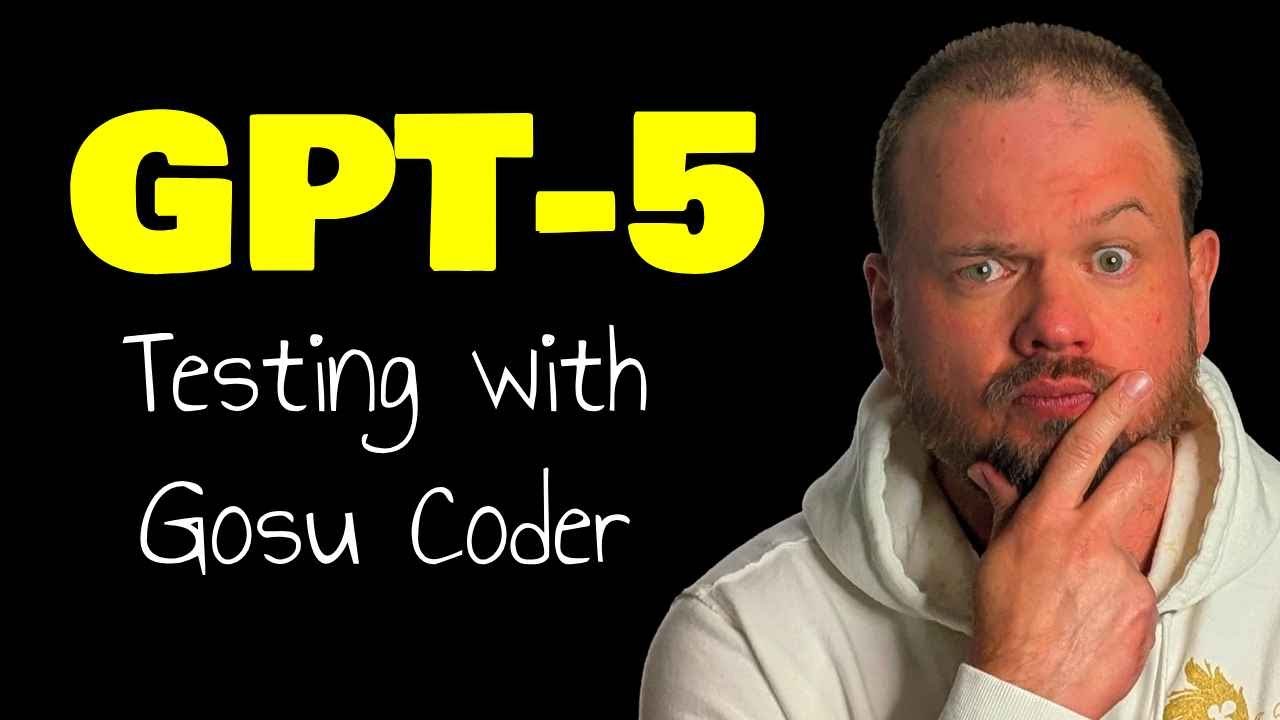The video features a detailed discussion with Gosu Coder about GPT-5’s strengths in front-end coding and instruction following, while noting its slower performance on complex, long-running coding tasks compared to some competitors. The hosts highlight GPT-5’s practical uses, the evolving AI coding landscape, and the future role of AI as a tool to empower developers rather than replace them, emphasizing ongoing improvements and the importance of diverse AI coding tools.
The video features a live stream discussion between the host and Gosu Coder, a well-known figure in the AI coding community, focusing on the capabilities and performance of GPT-5. Gosu Coder shares his perspective that while GPT-5 is a solid and good model, it does not yet surpass other models like Sonnet 4.1 in handling complex, long-running coding tasks. He notes that GPT-5 excels more in front-end coding and instruction following but is slower and less efficient in executing extensive agent loops compared to some competitors. The conversation highlights the importance of using GPT-5 in its high reasoning mode to unlock its full potential, as many users may be experiencing suboptimal results due to routing issues in the model’s deployment.
The discussion delves into benchmarking approaches, with Gosu Coder explaining his unique method of evaluating models based on their ability to follow instructions over longer, more complex coding tasks rather than simple one-off problems. His benchmarks emphasize real-world coding scenarios where models must build and test features across multiple files and maintain code integrity. GPT-5 scores well in these tests, showing strong instruction adherence, though it remains slower than some other models. The conversation also touches on other AI coding tools like Cloud Code, Quint 3 Coder, and open-source projects, with Cloud Code being praised for its cost-effectiveness and usability, especially for newcomers and even younger coders.
Both participants express enthusiasm about the rapid progress in open-source AI models, particularly those emerging from China, which are closing the gap with proprietary models and fostering healthy competition. They discuss the challenges and opportunities in the AI coding space, including the need for better model harnesses, improved codebase navigation, and more efficient quantization techniques to reduce computational costs without sacrificing quality. The conversation also reflects on the broader AI landscape, noting that while GPT-5 is strong in some domains like e-commerce marketing, it is not a revolutionary leap forward in coding AI, and the industry may be approaching a plateau in large language model advancements until a new breakthrough emerges.
The hosts also explore the future of AI in software engineering, agreeing that AI will not replace skilled engineers but will empower a broader range of people to create simple applications and automate routine tasks. They compare this evolution to the digital camera revolution, where professional photographers remain essential despite the widespread accessibility of photography tools. The discussion highlights the changing skill requirements for engineers, who now need broader business and architectural understanding to complement AI assistance. They also touch on the importance of context windows in models, the potential of reinforcement learning for continuous improvement, and the challenges of keeping AI models up-to-date with the latest coding libraries and practices.
In closing, the video emphasizes the practical strengths of GPT-5 in generating small coding solutions and its potential as a planning tool when paired with faster execution models. The hosts acknowledge current limitations such as speed and occasional code duplication but remain optimistic about ongoing improvements in tooling and harness design. They encourage viewers to explore various AI coding tools, especially those like Root Code and Cloud Code, which balance ease of use with customization. The conversation ends with a call to appreciate the nuanced role of AI in coding today and in the future, recognizing that while GPT-5 is a valuable addition to the AI toolkit, the journey toward more advanced and efficient coding AI continues.
